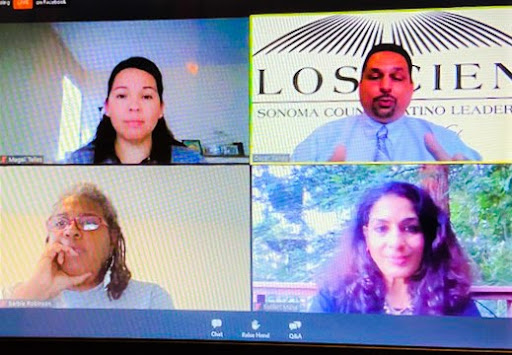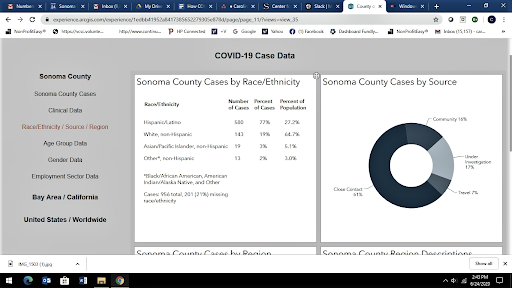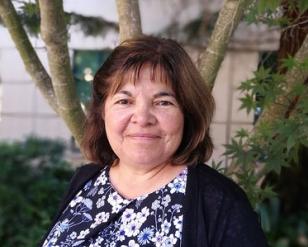“We (Latinos) are disposable,” stated Dr. Enrique Gonzalez in a Town Hall that Los Cien held recently. This was one of the many statements made during the evening as community members were gathered to discuss the impact of COVID-19 on the Latinx Community. I think it's fair to say that this was how many of the participants were feeling as well. In Sonoma County it was stated that 2/3s of the cases were Latino. At the time of the meeting, out of 348 cases, 64% were Latino. In Marin County 16% of their cases are Latino. It is clear that the Latino community has been heavily affected by the Coronavirus. The question before the group was what can we as a community do about it?

Oscar Pardo, Board Member of Los Cien; Barbie
Robinson, Director of Dept. of Health
Services & Dr. Sundari Mase, Health Officer for
Sonoma County.
The Town Hall was held on Zoom to try to address the concerns that the community has about the high numbers of COVID-19 positives within the Latinx population. The leadership of Los Cien led the conversation while taking questions from participants. Community members were asking about resources and who to contact for various issues that have come up such as mask wearing and social distancing not being implemented or required at the largest supermarket in Roseland. The person that witnessed it did not want to call the police for fear of what may happen to any member of the Latinx community. Marcos Suarez, who works for the Economic Development Board for the County of Sonoma, stated that some of the small businesses are having a hard time staying afloat.
Then the discussion moved to the debate that is taking place in the greater community and that is opening up versus the health of the residents of Sonoma County. Marcos and others stated that workers are afraid to work because in some cases they are not feeling protected, but many Latinos must work in order to support their families. It is a dilemma that many people are in. Following this town hall, Los Cien hosted a second Zoom recently with Dr. Sundari Mase, the County Health Officer and Barbie Robinson, Director of Sonoma County Department of Health Services. This was a good follow-up because there were a lot of unanswered questions in the town hall.
At the Zoom with Director Robinson and Dr. Mase, they were able to clarify some of the data, which was very helpful. For example, Latinx now make-up 77% of the positive COVID cases. The numbers are rising as more testing is being done. Dr. Mase stated that we are now doing 800 to 900 tests per day. Given that there are many barriers for Latinx people including institutional racism, being essential workers, and the lack of housing in Sonoma County; it is not surprising that this is happening. Latinx people are a large percentage of “essential workers. Thus, they are becoming infected at work or their work sites; and then they take it home; which in many cases, generally speaking, includes extended families or groups of Latinos living together. Then they infect family members or roommates. This seems to be the main reason that so many Latinx are infected. The primary ages within the Latinx community are 0 to 49. So, many younger adults, as well as kids are being infected, many of whom are asymptomatic and less likely to be hospitalized. However, it is easily transmittable. The key right now is to make sure as many people get tested as possible so that they can be isolated if they are positive, Dr. Mase reminded us. Learn more in General Testing Information.

So, what is being done? Barbie Robinson and Dr. Mase talked about data tracking and using the Coronavirus Data Dashboard as a monitoring guide. She also discussed the fact that the Board of Supervisors is hiring an Equity Officer; which is going to be really important in addressing some of the barriers mentioned earlier. Dr. Mase stated that the County is preparing for a future surge based on their modeling. The fact that we are doing more testing is a good thing. But obviously our numbers are increasing due to the amount of testing now being done and other exposures. The goal is to minimize the spread of the virus within the Latinx community by getting as many people tested as possible.
As I write this blog, the numbers continue to increase within the Latinx community. It is my hope that as I heard in another meeting on the same topic, with that the hiring of an Equity Officer (hopefully that is bilingual and bi-cultural) and as methods used to get the word out into the community become more effective; we will start to see a decrease in positive cases within the Latinx community.


